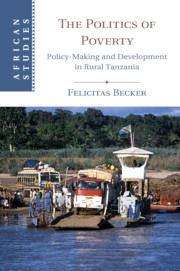Book contents
- The Politics of Poverty
- African Studies Series
- The Politics of Poverty
- Copyright page
- Contents
- Acknowledgements
- Map
- Introduction
- 1 The End of Slavery, Famine, and Food Aid in Tunduru
- 2 Changing Configurations of Poverty in the Colonial Southeast and the Myth of Communalism
- 3 The Struggle to Trade
- 4 Independence and the Rhetoric of Feasibility
- 5 Villagisation and the Pursuit of Market Access
- 6 The Politics of Development in the Era of Liberalisation
- 7 Performing and Pursuing Development in Kineng’ene
- Conclusion
- Bibliography
- Index
- African Studies Series
Introduction
Published online by Cambridge University Press: 17 June 2019
- The Politics of Poverty
- African Studies Series
- The Politics of Poverty
- Copyright page
- Contents
- Acknowledgements
- Map
- Introduction
- 1 The End of Slavery, Famine, and Food Aid in Tunduru
- 2 Changing Configurations of Poverty in the Colonial Southeast and the Myth of Communalism
- 3 The Struggle to Trade
- 4 Independence and the Rhetoric of Feasibility
- 5 Villagisation and the Pursuit of Market Access
- 6 The Politics of Development in the Era of Liberalisation
- 7 Performing and Pursuing Development in Kineng’ene
- Conclusion
- Bibliography
- Index
- African Studies Series
Summary
This book has its origin in a number of questions that I found impossible to avoid while researching the impoverished colonial past of Southeast Tanzania, and in the process negotiating its impoverished present.1 To wit: why is it that rural poverty in this egion appears both easy to explain and mystifying, whether judging by historical sources or by everyday conversation? Why, in the early to mid-2000s when I did most of my fieldwork, was maendeleo, ‘development’, on everybody’s lips, when actual attempts at fostering development had been ephemeral and/or unpopular for decades? Why is it that some of the stratagems then being tried in development projects were near-identical to ones tried in the 1930s, yet being offered as something new? What kept the development show on the road? Moreover, why did many people who had very little means to improve their situation appear ready to hold their poverty against themselves? And why is it that the purveyors of development, officials and experts alike, appeared to balance so awkwardly between their often extensive knowledge of the region’s problems and a variety of more or less glib jargons used to describe putative ways to address it? This could be observed, mutatis mutandis, both in the colonial archive and in the public meetings focused on development then ongoing.
- Type
- Chapter
- Information
- The Politics of PovertyPolicy-Making and Development in Rural Tanzania, pp. 1 - 42Publisher: Cambridge University PressPrint publication year: 2019

